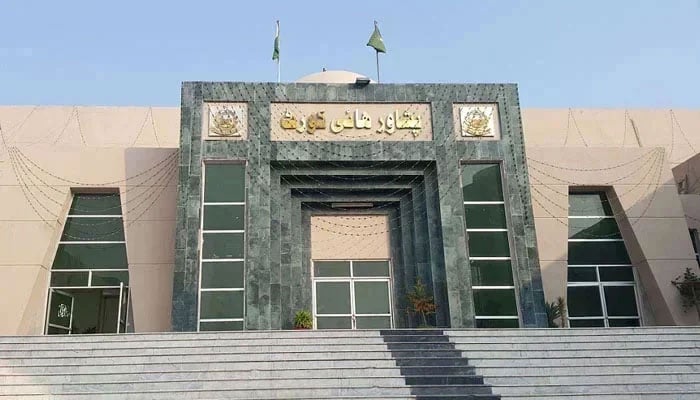Restrictions on wheeling system: PHC seeks responses from Pedo, Nepra and others
PESHAWAR: The Peshawar High Court (PHC) on Wednesday sought responses from the Pakhtunkhwa Energy Development Organisation (Pedo), the federal government, the National Electric Power Regulatory Authority (Nepra), and other relevant authorities on a petition challenging restrictions on the wheeling system for low-cost electricity transmission in Khyber Pakhtunkhwa.
A two-member bench comprising Justice Sahibzada Asadullah and Justice Wiqar Ahmad heard the petition filed by the Khyber Pakhtunkhwa Textile Mills Association.
During the hearing, the petitioners’ counsel, Shumail Ahmad Butt, informed the court that Khyber Pakhtunkhwa was the leading producer of electricity in Pakistan, particularly low-cost hydropower, which was generated at a cost of just Rs2-3 per unit. However, this electricity was being sold to mills at exorbitant rates of Rs60-70 per unit, he added.
The counsel argued that the federal government had initially introduced a wheeling system to facilitate the transmission of electricity, allowing industries to receive power at lower costs.
Under this system, hydropower units could transmit electricity directly to their affiliated industrial units, with payments made to both federal and provincial governments for transmission usage. However, the federal government later directed all distribution companies (DISCOs) to halt the implementation of the wheeling system, citing potential operational issues.
Highlighting the consequences of this policy, the counsel stated that the textile sector, already under significant pressure, has been further impacted by these restrictions. He argued that the wheeling system would enable industrial units to access affordable electricity, which would, in turn, resolve multiple issues, provide employment opportunities, and reduce inflation.
-
 Zayn Malik Shares Important Update About His Love Life
Zayn Malik Shares Important Update About His Love Life -
 Kate Middleton, William Are Holding Onto Their Hats As Worse Gets Threatened: Behind The Veil Of Shame
Kate Middleton, William Are Holding Onto Their Hats As Worse Gets Threatened: Behind The Veil Of Shame -
 British Soap Awards Scrapped Again As ITV Confirms 2026 Hiatus
British Soap Awards Scrapped Again As ITV Confirms 2026 Hiatus -
 Climate Nearing Dangerous Tipping Points, Study Shows
Climate Nearing Dangerous Tipping Points, Study Shows -
 James Van Der Beek, 'Dawson's Creek' Star, Dies At 48
James Van Der Beek, 'Dawson's Creek' Star, Dies At 48 -
 Threads Launches Dear Algo AI Feature To Personalise Feeds In Real Time
Threads Launches Dear Algo AI Feature To Personalise Feeds In Real Time -
 Police Take Action Over Andrew's Ties With Jeffrey Epstein While In UK Office
Police Take Action Over Andrew's Ties With Jeffrey Epstein While In UK Office -
 Courtney Love Makes First Appearance Since New Report On Kurt Cobain's Death
Courtney Love Makes First Appearance Since New Report On Kurt Cobain's Death -
 King Charles Anxious As Uncertainty Grows Over Sarah Ferguson’s Next Move
King Charles Anxious As Uncertainty Grows Over Sarah Ferguson’s Next Move -
 Real Reason Kim Kardashian Is Dating Lewis Hamilton
Real Reason Kim Kardashian Is Dating Lewis Hamilton -
 Rihanna Leaves Elderly Woman Star-struck In Viral Grocery Store Video
Rihanna Leaves Elderly Woman Star-struck In Viral Grocery Store Video -
 TikTok US Launches Local Feed Using Precise Location Data
TikTok US Launches Local Feed Using Precise Location Data -
 Jill Biden’s Former Husband Charged With Wife’s Murder
Jill Biden’s Former Husband Charged With Wife’s Murder -
 Zayn Malik Reveals Parenting Decision Gigi Hadid Criticized Him Over
Zayn Malik Reveals Parenting Decision Gigi Hadid Criticized Him Over -
 Palace Releases Prince William's Photos From Final Day Of His Saudi Arabia Visit
Palace Releases Prince William's Photos From Final Day Of His Saudi Arabia Visit -
 Microsoft Warns Of AI Double Agents As Enterprise Adoption Of AI Agents Surges
Microsoft Warns Of AI Double Agents As Enterprise Adoption Of AI Agents Surges




